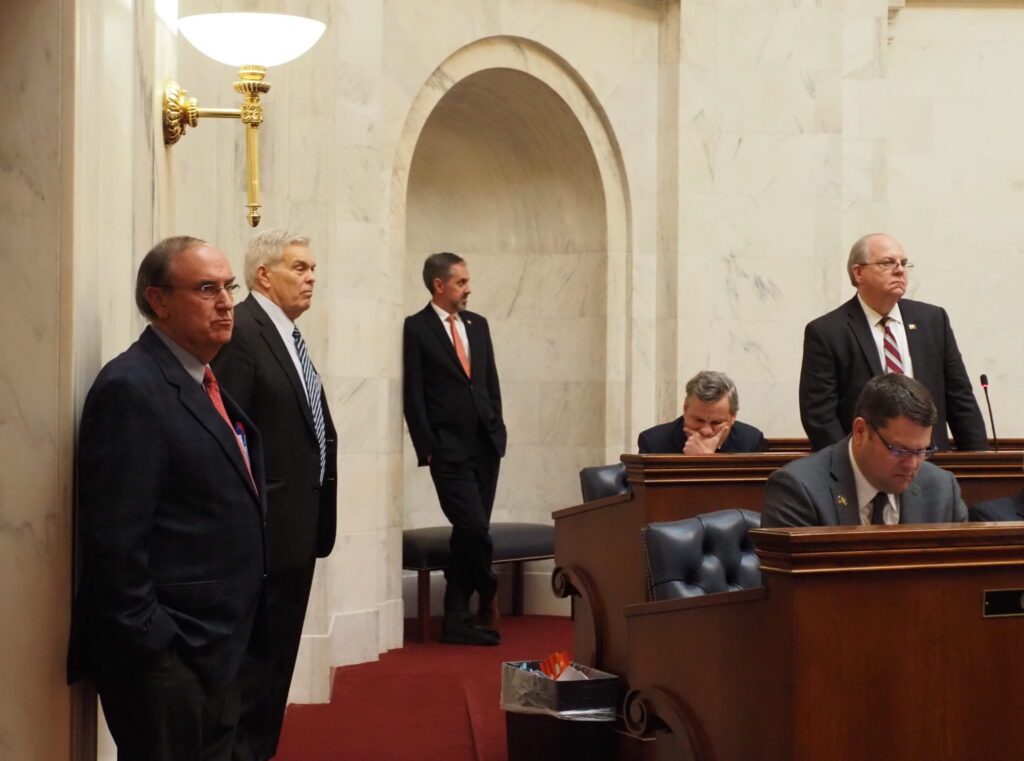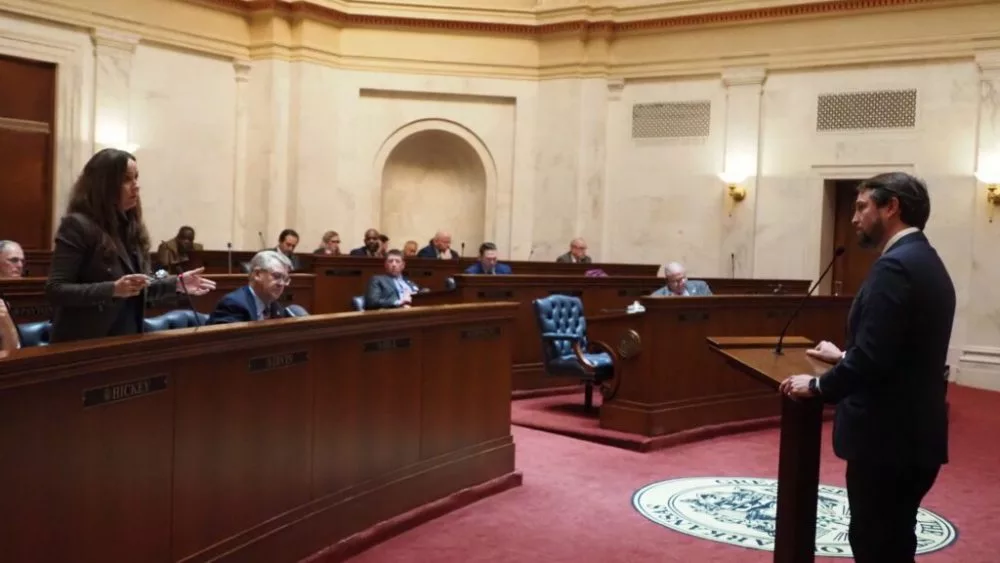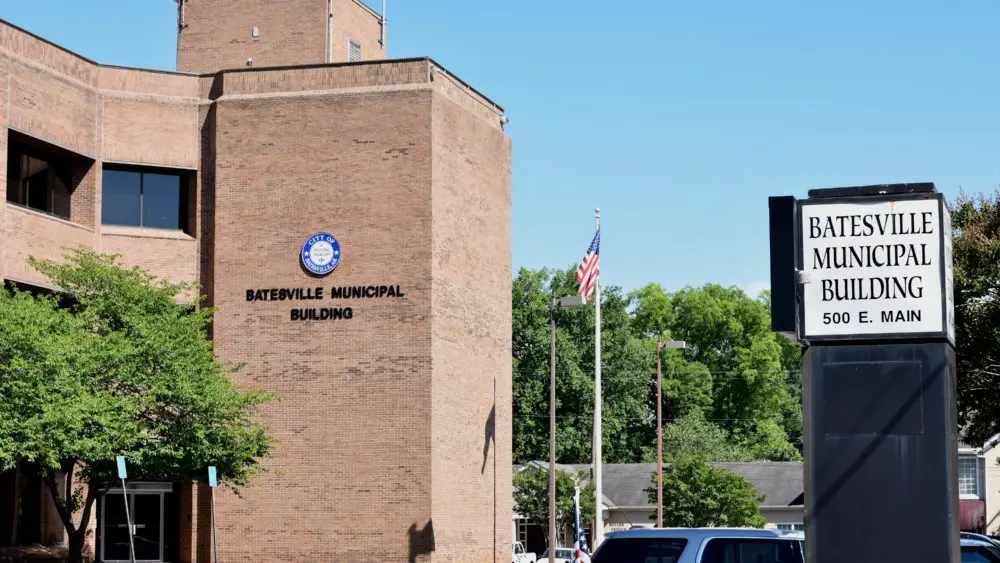Sen. Missy Irvin (left), R-Mountain View, asks a question of Sen. Clarke Tucker (right), D-Little Rock, on the Senate floor on Monday, February 17, 2025. (Tess Vrbin/Arkansas Advocate)
By Antoinette Grajeda, Arkansas Advocate
The pace of work at the Capitol slowed slightly as a winter storm blew across Arkansas during the sixth week of the legislative session. Although some lawmakers stayed home and a few meetings were canceled, committees still met and advanced legislation, some of which made it all the way to the governor’s desk.
Gov. Sarah Huckabee Sanders at a Thursday press conference signed into law two bills she supported — one that will restrict public school students’ cellphone usage and one to provide free breakfast to all students, regardless of their eligibility for free or reduced-price meals.
“Hunger and mental health affect every single community, every district in the state — bright red or deep blue,” Sanders said. “These are bipartisan issues, and I’m proud that we were able to address them with bipartisan support.”
Sanders also signed into law Thursday a handful of other legislation, including her Healthy Moms, Healthy Babies Act, according to a press release. The two identical bills will make changes to the state’s Medicaid program in hopes of improving the state’s poor maternal health outcomes.
As those three bills ended their trip through the Legislature this week, the journey began for the governor’s higher education legislation. As promised, lawmakers filed Arkansas ACCESS last Monday and it will likely be heard in March.
1) Direct democracy
Debate over regulating the citizen petition-gathering process dominated the discussion in the House Committee on State Agencies and Governmental Affairs this week.
After a six-hour meeting last Monday, a legislative panel advanced two bills that would require canvassers to request a signer’s photo ID and to sign a “true affidavit” certifying the canvasser complied with state laws while gathering signatures for a ballot measure. The bills were later amended and must return to the committee.
The legislative panel also held a bill Monday that would require canvassers to notify signers that petition fraud is a Class A misdemeanor. A divided committee approved an amended version of the bill Wednesday that classifies the fraud as a “criminal offense.” The wording was changed to avoid a possible conflict with existing statute.
All three bills are sponsored by Benton Republican Sen. Kim Hammer, who is running for secretary of state, the official who oversees Arkansas’ elections.
Though Hammer said his legislation will improve the integrity of citizen-led ballot measures, critics argued they will create “a chilling effect” that will lead to decreased participation and increased difficulty in qualifying for the ballot.
Hammer is also co-sponsor of two other bills related to the ballot initiative process with Maumelle Republican Rep. David Ray. House Bill 1221 would clarify that certified ballot titles and signatures collected for those measures would only be valid for the next general election.
House Bill 1222 would allow the attorney general to reject a proposal if it conflicts with the U.S. Constitution or federal statutes. It would also prevent a sponsor from submitting more than one conflicting petition for approval at the same time.
The Senate approved both of those bills Tuesday and sent them to the governor’s desk.
House Speaker Brian Evans, R-Cabot, said the proposed package of initiative petition regulations is “phase two” of the Legislature’s “strong stance… on voter protection and election integrity” established in the previous legislative session.
In 2023, the Legislature passed and Sanders signed Act 236, which raised the minimum number of counties from 15 to 50 in which canvassers for ballot measures must collect signatures from registered voters. The law is being challenged in the courts.
“As long as they are following the steps of proper identification, following the steps that are laid out as far as the initiative of the ballot process, I can’t see how [this year’s legislation] impairs any one of their rights,” Evans said in a press conference Thursday.
2) Big Bird and librarians
The Senate on Monday approved a proposal to abolish the boards that oversee public libraries and Arkansas PBS and transfer those powers to the state Department of Education. Both boards are currently under the department but operate independently.
Opponents of Senate Bill 184 voiced concerns that Arkansas PBS would lose funding if its governance were no longer independent of the executive branch.
 From left: Arkansas Sens. Mark Johnson, R-Ferndale; Dan Sullivan, R-Jonesboro; Greg Leding, D-Fayetteville; and Terry Rice, R-Waldron listen to debate on the Senate floor on Monday, February 17, 2025. The Senate passed a bill Sullivan sponsored that would abolish the Arkansas State Library Board and the Arkansas Educational Television Commission. Leding voted against the bill while Johnson and Rice voted for it. (Tess Vrbin/Arkansas Advocate)
From left: Arkansas Sens. Mark Johnson, R-Ferndale; Dan Sullivan, R-Jonesboro; Greg Leding, D-Fayetteville; and Terry Rice, R-Waldron listen to debate on the Senate floor on Monday, February 17, 2025. The Senate passed a bill Sullivan sponsored that would abolish the Arkansas State Library Board and the Arkansas Educational Television Commission. Leding voted against the bill while Johnson and Rice voted for it. (Tess Vrbin/Arkansas Advocate)
Jonesboro Republican Sen. Dan Sullivan, a longtime critic of Arkansas PBS and library content, is the sponsor of SB 184 and SB 181, the latter of which would loosen the current requirement for library directors to hold a master’s degree “from an accredited American Library Association program.”
The Senate approved SB 181 on Wednesday and both bills will next be considered by House committees.
This week also marked the end of Sullivan’s work on SB 3, a bill that would “prohibit discrimination or preferential treatment” by state entities. Sanders signed the bill into law Tuesday, according to a press release.
3) Communist education
Another bill that made it to Sanders’ desk this week is House Bill 1060, which would require public schools to teach about “the failures of communist and autocratic systems” of government. HB 1060 passed the Senate Tuesday with solely Republican support.
Bentonville Republicans Rep. Scott Richardson and Sen. Jim Dotson sponsored a similar bill in 2023 that passed the House, also with only Republican support, but it did not make it to the Senate floor.
4) New bills
Lawmakers filed more than 100 new bills by Thursday evening, including:
House Bill 1494 by Rep. R.J. Hawk, R-Bryant, would create the “Arkansas Guidance Out of the Darkness Act” and would require state agencies to publish federal documents online.
House Bill 1515 by Rep. Stetson Painter, R-Mountain Home, would amend the law to allow organized militia to be called into active service for anything related to “the execution of military justice,” including confinement, or for the voluntary support of the Arkansas National Guard or Department of the Military to address critical staffing shortages.
House Bill 1518 by Rep. Stephen Meeks, R-Greenbrier, would create the offense of creating, distributing, possessing or viewing AI-generated content depicting sexually explicit conduct involving a child.
House Bill 1535 by Rep. Matt Duffield, R-Russellville, could allow for chemical castration for someone convicted of rape of a child 12 years old or younger.
Resolutions filed this week also provided a better idea of the timeline for the second half of the session. One resolution would allow lawmakers to recess for Spring Break in late March, while the other would extend the session. If approved, the 95th General Assembly’s work could conclude on April 16, and lawmakers would officially adjourn sine die on May 5.
Regular sessions last 60-75 days while fiscal sessions are limited to 30 days. They can be extended by votes of the legislators.
Evans said Thursday that filing a resolution to extend the session “is standard” and a precautionary measure, but the Legislature could still finish its work by April 4 as currently planned.
Reporter Tess Vrbin contributed to this report.
The Arkansas Advocate is a nonprofit, nonpartisan news organization dedicated to tough, fair daily reporting and investigative journalism that holds public officials accountable and focuses on the relationship between the lives of Arkansans and public policy.
Have a news tip or event to promote? Email White River Now at news@whiterivernow.com. Be sure to like and follow us on Facebook and Twitter. And don’t forget to download the White River Now mobile app from the Google Play Store or the Apple App Store.
Get up-to-date local and regional news/weather every weekday morning and afternoon from the First Community Bank Newsroom on Arkansas 103.3 KWOZ. White River Now updates are also aired on weekday mornings on 93 KZLE, Outlaw 106.5, and Your FM 99.5. Catch CBS News around the top of every hour on 1340 KBTA.







